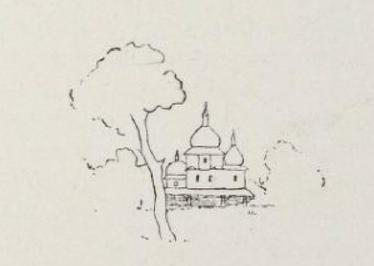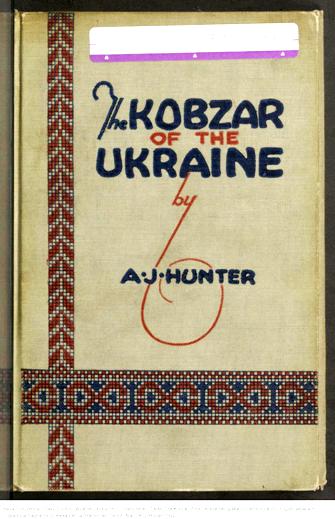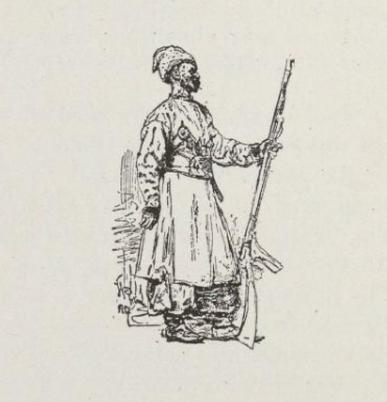|
|
|
|
|

Taras Shevchenko
THE MONK
"Chernecj" / "U Kyjevi na Podoli Bulo kolysj..."
Translated by Alexander Jardine Hunter
It happened sometimes, when a cossack warrior found his energies failing and his joints growing stiff front much campaigning, he would bethink him of his sins and deeds of blood. These things weighing on his mind, he would decide to spend the remainder of his life in a monastery, but before taking this irrevocable step, he would hold a time of high revel with his old comrades. This poem pictures such an event.
| |
At Kiev, in the low countrie,
Things happened once that you'll never see.
For evermore, 'twas done;
Nevermore, 'twill come.
Yet I, my brother,
Will with hope foregather,
That this again I'll see,
Though grief it brings to me.
To Kiev in the low countrie
Came our brotherhood so free.
Nor slave nor lord have they,
But all in noble garb so gay
Came splashing forth in mood full glad —
With velvet coats the streets are clad.
They swagger in silken garments pride
And they for no one turn aside.
In Kiev, in the low countrie,
All the cossacks dance in glee,
Just like water in pails and tubs
Wine pours out 'mid great hubbubs.
Wine cellars and bars
with all the barmaids
The cossacks have bought
with their wines and meads.
With their heels they stamp
And dancing tramp,
While the music roars
And joyously soars.
The people gaze
with gladsome eyes,
While scholars of the cloister schools
All in silence bred by rules,
Look on with wondering surprise.
Unhappy scholars!
Were they free,
They would cossacks dancing be.
Who is this bv musicians surrounded
To whom the people give fame unbounded?
In trousers of velvet red*
With a coat that sweeps the road
A cossack conies.
Let's weep o'er his years
For what they've done is cause for tears.
But there's life in the old man vet I trust,
For with dancing kicks
he spurns the dust.
In his short time left with men to mingle
The cossack sings,
this tipsy jingle.
"On the road is a crab, crab, crab.
Let us catch it grab, grab, grab.
Girls are sewing jab, jab, jab.
Let's dance on trouble,
Dance on it double
Then on we'll bubble
Already this trouble
We-ve danced on double
So let's dance on trouble,
Dance on it double,
Then on we'll bubble."
To the Cloister of our Saviour
Old gray-hair dancing goes.
After him his joyous crowd
And all the folk of Kiev so proud.
Dances he up to the doors —
"Hoo-hoo! Hoo-hoo!" he roars.
Ye holy monks give greeting
A comrade from the prairie meeting.
Opens the sacred door,
The Cossack enters in.
Again the portal closes
To open no more for him.
What a man was there
this old gray-hair,
Who said to the world farewell?
'Twas Semon Palee,
a cossack free
Whom trouble could not quell.
Oh in the East the sun climbs high
And sets again in the western sky.
In narrow cell in monkish gown
Tramps an old man up and down,
Then climbs the highest turret there
To feast his eyes on Kiev so fair,
And sitting on the parapet
lie yields a while to fond regret.
Anon he goes to the woodland spring,
The belfry near, where sweet bells ring.
The cooling draught to his mind recalls
How hard was life without the
Again the monk his cell floor paces
'Mid the silent walls his life retraces.
The sacred book he holds in hand
And loudly reads,
The old man's mind to Cossack land
Swiftly speeds.
Now holy words do fade away.
The monkish cell turns Cossack den,
The glorious brotherhood lives again.
The gray old captain, like an owl
Peers beneath the monkish cowl
Music, dances, the city's calls,
Rattling fetter, Moscow's walls.
O'er woods and snows
his eves can see
The banks of distant Yenisee.
Upon his soul deep gloom has crept
And thus the monk in sadness wept.
Down, Down! Bow thy head;
On thy fleshly cravings tread.
In the sacred writing's read.
Read, read, to the bell give heed,
Thy heart too long has ruled thee,
All thy life it's fooled thee,
Thy heart to exile led thee,
Now let it silent be.
As all things pass away,
So thou shaft pass away.
Thus may'st thou know thy lot,
Mankind rein embers not.
Though groans the old man's sadness tell,
Upon his book he quickly fell,
And tramped and tramped about his cell,
lie sits again in mood forlorn
Wonders why he e'er was born.
One thing alone he fain would tell,
He loves his Ukraina well
For Matins now
the great bell booms,
The aged monk
his cowl resumes.
For Ukraina now to pray
My good old Palee limps away.
|
|
Taras Shevchenko's poem "The Monk"
"Chernecj" / "U Kyjevi na Podoli Bulo kolysj..."
("Чернець" / "У Києві на Подолі Було колись...")
1848, Orsjka fortecja (Орська фортеця)
Translated by Alexander Jardine Hunter
Source: "The Kobzar of the Ukraine". Being select Poems of Taras Shevchenko. Done into English Verse with Biographical Fragments by Alexander Jardine Hunter, p. 13 - 20.
Source of the illustrations - the same book.
Source of the original poem in Ukrainian:
Taras Shevchenko. Zibrannja tvoriv: U 6 t. — K., 2003. — T. 2: Poezija 1847-1861. — S. 49-52; 583-586.
| |
Тарас Шевченко
ЧЕРНЕЦЬ
У Києві на Подолі
Було колись... І ніколи
Не вернеться, що діялось,
Не вернеться сподіване,
Не вернеться... А я, брате,
Таки буду сподіватись,
Таки буду виглядати,
Жалю серцю завдавати.
У Києві на Подолі
Братерськая наша воля
Без холопа і без пана,
Сама собі у жупані
Розвернулася весела,
Аксамитом шляхи стеле,
А єдвабном застилає
І нікому не звертає.
У Києві на Подолі
Козаки гуляють.
Як ту воду, цебром-відром
Вино розливають.
Льохи, шинки з шинкарками,
З винами, медами
Закупили запорожці
Та й тнуть коряками.
А музика реве, грає,
Людей звеселяє.
А із Братства те бурсацтво
Мовчки виглядає.
Нема голій школі волі,
А то б догодила...
Кого ж то там з музикою
Люде обступили?
В червоних штанях аксамитних
Матнею улицю мете.
Іде козак. — Ох, літа! літа!
Що ви творите? — На тоте ж
Старий ударив в закаблуки,
Аж встала курява! Отак!
Та ще й приспівує козак:
— По дорозі рак, рак,
Нехай буде так, так.
Якби таки молодиці
Посіяти мак, мак.
Дам лиха закаблукам,
Дам лиха закаблам,
Останеться й передам.
А вже ж тії закаблуки
Набралися лиха й муки!
Дам лиха закаблукам,
Дам лиха закаблам,
Останеться й передам!
Аж до Межигорського Спаса
Потанцював сивий.
А за ним і товариство
І ввесь святий Київ.
Дотанцював аж до брами,
Крикнув: «Пугу! пугу!
Привітайте, святі ченці,
Товариша з Лугу!»
Свята брама одчинилась,
Козака впустили,
І знов брама зачинилась,
Навік зачинилась
Козакові. Хто ж цей сивий
Попрощався з світом?
Семен Палій, запорожець,
Лихом не добитий.
Ой високо сонце сходить,
Низенько заходить.
В довгій рясі по келії
Старий чернець ходить.
Іде чернець у Вишгород
На Київ дивитись,
Та посидіть на пригорі,
Та хоч пожуритись.
Іде чернець Дзвонковую
У яр воду пити
Та згадує, як то тяжко
Було жити в світі.
Іде чернець у келію
Меж стіни німії
Та згадує літа свої,
Літа молодії.
Бере письмо святе в руки,
Голосно читає...
А думкою чернець старий
Далеко літає.
І тихнуть Божії слова
І в келії, неначе в Січі,
Братерство славне ожива.
А сивий гетьман, мов сова,
Ченцеві зазирає в вічі.
Музика, танці і Бердичів.
Кайдани брязкають... Москва,
Бори, сніги і Єнісей...
І покотились із очей
На рясу сльози... Бий поклони!
І плоть старечу усмиряй.
Святе писаніє читай,
Читай, читай та слухай дзвона,
А серцеві не потурай,
Воно тебе в Сибір водило,
Воно тебе весь вік дурило.
Приспи ж його і занехай
Свою Борзну і Фастовщину,
Загине все, ти сам загинеш.
І не згадають, щоб ти знав...
І старець тяжко заридав.
Читать писаніє покинув.
Ходив по келії. Ходив,
А потім сів і зажурився:
— Для чого я на світ родився,
Свою Україну любив? —
До утрені завив з дзвіниці
Великий дзвін. Чернець мій встав,
Надів клобук, взяв патерицю,
Перехрестився, чотки взяв...
І за Україну молитись
Старий чернець пошкандибав.
|
|
За матеріалами: Тарас Шевченко. Зібрання творів: У 6 т. — К., 2003. — Т. 2: Поезія 1847-1861. — стор. 49-52; 583-586.
Read more:
 "The Kobzar of the Ukraine". Being select Poems of Taras Shevchenko. Done into English Verse with Biographical Fragments by Alexander Jardine Hunter. "The Kobzar of the Ukraine". Being select Poems of Taras Shevchenko. Done into English Verse with Biographical Fragments by Alexander Jardine Hunter.
Споріднені публікації, за тегами:
|
|
|
|
|
|


